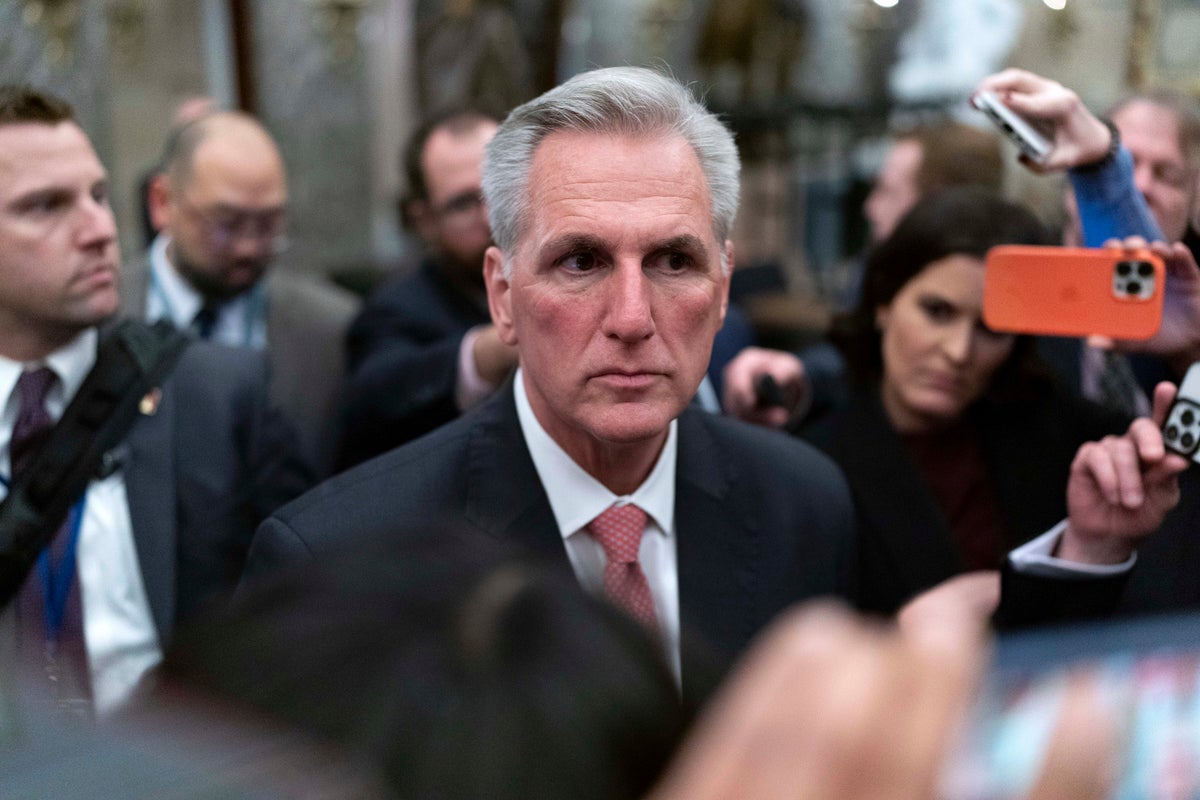
The House of Representatives remains without a speaker to succeed veteran Democrat Nancy Pelosi as the new Republican majority fails to agree on a candidate after three days of bitter in-fighting.
California congressman and House majority leader Kevin McCarthy has suffered the extraordinary indignity of failing to secure the 218 votes needed to claim the gavel in no fewer than 11 successive roll call votes, as a group of hard right Republicans part of the “Freedom Caucus” group, or as they have been deemed, the “Never Kevins”, continue to refuse to back him, delaying the start of the 118th Congress in the process.
Without a speaker, members cannot be sworn in and representatives cannot be appointed to any committees, which in turn cannot hire staff or begin operations.
The likes of Florida representative Matt Gaetz and Colorado’s Lauren Boebert have been leading the opposition to Mr McCarthy’s ascent to the chair and grandstanding about their exploits on Fox News.
Mr Gaetz has threatened to resign rather than back a moderate while Ms Boebert has argued that the chaos is actually good news for the American taxpayer because it means the House cannot approve the award of additional military aid to Ukraine.
Perhaps most incredibly of all, Georgia’s Marjorie Taylor Greene has found herself a moderating voice, appealing for a resolution to the deadlock and complaining that she has been “getting beat up a little bit from conservatives that don’t understand what is really happening”.
Democrats, meanwhile, remained unified behind New York congressman Hakeem Jeffries, who has repeatedly come out on top in voting, but still shy of a majority.
President Joe Biden has called the stalemate “a little embarrassing” and urged Republicans to “get their act together” because “the rest of the world is looking”.
Speaking to The Independent on Thursday, Democrat congresswoman Alexandria Ocasio-Cortez of New York said the Republican squabbling only served to illustrate precisely how open to compromise and negotiation her own progressive wing is by comparison.
“Whether you’re Democrat, Republican or independent, what this whole episode really indicates and shows us is, again, just how bad faith and substance-less the argument and accusation is that progressives are just as bad as these insurrectionist Republicans,” she said.
“The more days that this goes on the more this truly starts to have a corrosive impact on our country,” she added.
“Right now, members of Congress, because we were not sworn in, we do not have access to our security clearances or liaising capacities with agencies like the IRS [Internal Revenue Service] or USCIS [United States Citizenship and Immigration Services].
“We cannot conduct constituent casework to the same extent that we would otherwise and as a result, the longer this goes on, the more real impact there is and the more people are going to suffer.”
There is no obvious end in sight to at the time of writing, meaning the humiliation of Mr McCarthy, has already resulted in the longest House speaker vote since 1855. The only time multiple votes has been require since the start of the 20th century is 1923. That took nine ballots.
Congress has elected a House speaker 127 times in its history, beginning with Frederick Muhlenberg of Pennsylvania in 1793.
On only 14 occasions has it required multiple ballots to find a winning candidate, with 13 of those instances occurring before the outbreak of the American Civil War in 1861.
Most of these disputes were resolved after one or two rounds of voting, although there have been some notably drawn-out exceptions.
These include the election of John W Taylor as speaker to the 16th Congress in 1819, which took 22 ballots to resolve, Philip Pendelton Barbour to the 17th in 1821 (12), John Bell to the 23rd in 1833 (10), Robert Mercer Taliaferro Hunter to the 26th in 1839 (11), Howell Cobb to the 31st in 1849 (an incredible 63), William Pennington to the 36th in 1859 (44) and Frederick Huntington Gillett to the 68th in 1923 (nine).
But the longest battle to find a House speaker occurred at the beginning of the 34th Congress, commencing on 3 December 1855 and not resolved until 2 February 1856.
That marathon contest was finally won by Republican Nathaniel Prentice Banks of Massachusetts, a former mill worker, abolitionist and future state governor and Union general, after a jaw-dropping 133 rounds of voting.
A complicating factor in the selection of a House speaker is that the US Constitution has almost nothing to say about how the lower chamber is supposed to go about it, according to Matthew Green, a professor of political science at the Catholic University of America
“All it says in Article One… is ‘The House shall choose their speaker.’ That’s it,” he told The Washington Post.
So hang in there Kevin.







